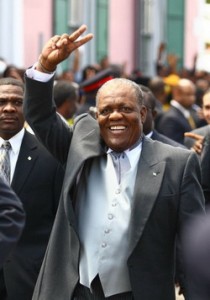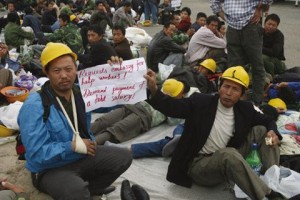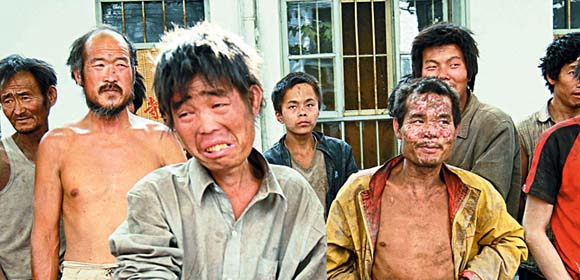
Nassau Bahamas — Hubert Ingraham and the FNM began talks with the Chinese to deliver 8,150 ‘peasant convicted workers’ into the country. BP believes it is Ingraham’s responsibility to decide whether or not the Chinese should be allowed to enter. It is a function of the Cabinet that grants work permits and sets immigration policies for the nation. Parliament has no grounds and it will be UNCONSTITUTIONAL to bring such a resolution to the House of Assembly.
While Ingraham is up to playing his tricks we would wish for him to bring to Parliament a resolution for the SALE OF BTC for all and sundry to vote yea or nay.
WE NEED CHANGE!
——————————————–
China’s use of prison labor in developing countries
Brahma Chellaney
China has devised a novel strategy to relieve pressure on its overcrowded prisons: Use convicts as labourers on oversea s projects in the developing world.
The practice has exposed another facet of China’s egregious human-rights record, which, when it comes to the overseas operations of Chinese companies, includes the government’s failure to enforce its own regulations.
Not only is China the world’s leading executioner – it puts to death three times as many people every year as the rest of the world combined – it also has one of the largest prison populations: 1.57 million inmates in 2009, according to the International Centre for Prison Studies at King’s College, London.
The forced dispatch of prisoners to work on overseas infrastructure projects raises new issues regarding China’s human-rights record. It also adds a new element – the dumping of convicts – to its trade and investment policy, which has been much criticized for dumping goods.
Thousands of Chinese convicts, for example, have been pressed into service on projects undertaken by state-run Chinese companies in Sri Lanka, a strategically important country for Beijing as it seeks to enhance its regional position in the Indian Ocean.
After providing Sri Lanka’s government with weapons systems that helped end the country’s decades-long civil war, China has been rewarded with port-building, railroad and other infrastructure projects.

Chinese convicts also have been sent to the Maldives, where the Chinese government is building 4,000 houses on several different islands as a government-to-government “gift” to win influence.
So far, however, China has failed to persuade the country’s President to lease it one of the 700 uninhabited Maldivian islands for use as a small base for the Chinese navy.
Chinese companies’ operating practice for overseas projects is to keep the number of local workers to a bare minimum and to bring in much of the work force from China, including convicts “freed” on parole for project-related overseas work.
Convict labourers, like the rest of the Chinese work force on such projects, are housed near the project site. That way, if any convict worker escaped, he would be easy to find in an alien setting.
In theory, such practices run counter to regulations promulgated by the Chinese commerce ministry in August of 2006, in response to a backlash against Chinese businesses in Zambia after the death of 51 Zambian workers in an explosion at a Chinese-owned copper mine.
These regulations called for “localization,” including hiring local workers, respecting local customs and adhering to safety norms. In October of 2006, the State Council – China’s cabinet – issued nine directives ordering that Chinese overseas businesses “pay attention to environmental protection,” “support local community and people’s livelihood cause” and “preserve China’s good image and its good corporate reputation.”
But Chinese regulations are sometimes promulgated simply to blunt external criticism, and thus are seldom enforced (except when a case attracts international attention).
 In 2003, for example, China enacted a law on environmental-impact assessments that was followed in 2008 by “provisional measures” to permit public participation in such assessments.
In 2003, for example, China enacted a law on environmental-impact assessments that was followed in 2008 by “provisional measures” to permit public participation in such assessments.
Yet, Chinese leaders remain more zealous about promoting exports and economic growth than in protecting the country’s air and water.
Similarly, the State Council’s 2006 directives to Chinese overseas companies have been subordinated to the drive for exports and growth, even when it imposes environmental and social costs on local communities abroad.
Indeed, as part of the government’s “going global” policy, Chinese companies are offered major incentives for bagging overseas contracts and boosting exports.
The use of convict labourers adds a disturbing new dimension to this strategy. But even before convicts became part of China’s overseas development effort, some Chinese projects, especially dam-building schemes, were embroiled in disputes with local communities in Botswana, Burma, Pakistan, Ghana and Sudan.
Several bombs exploded recently at the site of Burma’s Myitsone Dam, whose construction by a Chinese company in insurgency-torn Kachin state is displacing thousands of subsistence farmers and fishermen by flooding a wide swath of land.
Chinese companies can’t get thousands of prisoners released on their own, let alone secure passports and exit permits for them. It’s obvious that the practice of pressing convicts into service on overseas projects has been instituted by the Chinese government.
Until China’s treatment of its own citizens and those of other countries is guided by respect for basic human rights and the rule of law, Beijing is unlikely to command the respect it seeks on the world stage”.
Brahma Chellaney is a professor of strategic studies at the Centre for Policy Research in New Delhi and the author of Asian Juggernaut: The Rise of China, India and Japan.
http://www.thedominican.net/2010/08/china-use-of-prison.html








ummm….help me i might be lost but CHRISTIE was trying to get this done b4 he left RIGHT??!! if so then all of this would have ALREADY been in play…….meaning the cons or alleged cons would have been here LONG TIME and then what? i guess that still would mean that ingraham would have been accountable for not stopping it? get it together folks i agree that the whole house should make a decision for the country as whoever sits in the house was elected by YOU/US to sit and represent that and furthermore i think that there should be a NATIONAL vote since every one wants to have so much say…….we should just go to the polls and let the count tell the story.
Ingraham siad that this bay is Perry Christie baby, yes it is Christie’s baby, but Christie did not named the Chinese as the father, Ingraham is trying to give Christie’s baby a different father. Remember the Chinese was no way around when that baby was concieved. So Ingraham, please make your own decision, and leave Mr Christie alone.
I KNEW IT; 5000 CHINESE CONVICTS LET OUT ON WORK DETAIL, THAT’S WHO WILL BE SENT. BP you are right; the granting of permit issue is a matter for Ingraham’s cabinet to decide not by parliamentary resolution. Ingraham doesn’t want to take the political fall all by himself so he hatched this trick so he can tell the Bahamian people that parliament decided.It will not work though because any Bahamian fool on the street knows that this government is Ingraham and Ingraham alone is the government.
This fool, this fool, this fool.
Comments are closed.